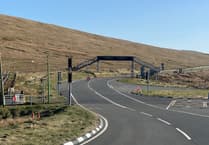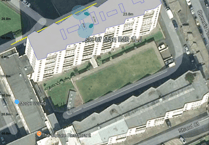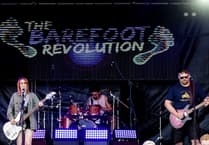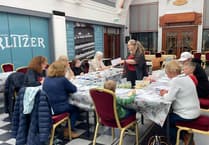A shop based in Ramsey is helping people to move away from plastic.
The Lightroom @Idea Hat is now selling products made using fruit peel waste instead.
Krill Design uses polymers extracted from that waste by Sanpellegrino, the large Italian drinks maker.
The polymer is made into a filament, which can be used in a 3D printer to print any product design.
OHMIE is a desk lamp or can be used for mood lighting with its dimmer switch.
It is available in orange, lemon or lime and costs £135.
Currently, only orange is in stock. Lemn and lime are available with three weeks’ delivery.
Smart phone holders are also available in orange, lemon, lime and coffee for £15.
Chris Swingler, of the Lightroom @IdeaHat in St Paul’s Square, Ramsey, explained how he first heard about the product.
‘I first met the founder of Krill Design when he was the lead project manager for Milan Expo 2015. He subsequently worked at Milan Polytechnic, one of Italy’s leading Universities prior to starting Krill Design.
‘We kept in touch and then I heard about their innovative project with Autogrill for whom they are transforming the peels of 28 million freshly squeezed oranges (per year) into products like baskets for the sugar on the espresso counters in their over 3,000 service stations on the Italian Motorway network.
‘These product have been branded internally within Autogrill as “WASORANGE” and the project aims to save 85 tonnes of CO2.
‘ Subsequently Krill Design went on to create their own products.’
The shop is promoting and selling two main products from Krill, Ohmie the world’s first desk lamp made from citrus peel and smart phone holders.
However, Krill now has more than 20 products in their catalogue and one new one recently released is a stool for children that has been used in playgroups and can weight bear up to 110kg (17 stone, 4lb), which Chris says is proof that furniture can be made from fruit peel waste.
‘Krill is re-using a natural waste product,’ said Chris. ‘So for a start it’s using a resource which otherwise was waste.
‘In addition these products are all compostable and bio-degradeable at end of life, so they won’t go to landfill.
‘The availability of the filament will mean that anyone with a 3D printer (at home, office or in industry)
will be able to print their own 3D product designs with a natural product.’
Krill Design has also been involved with a project with Milan City Council, in which they have harvested used coffee grinds from all the coffee shops from three districts in Milan and turned this into a polymer that can also be 3D printed into Design products
Some of the products made in this project include coasters in the shape of a coffee bean, pencil holders and book-marks.
One of most useful products made is a Smart Phone holder which has also been a popular seller in the Isle of Man.
Chris added: ‘Last year I was invited to be a part of the careers day at Sulby School. The children absolutely loved the concept. They had all heard about 3D printing but when they learnt that products could be printed with food waste they were amazed.
‘I explained what careers this could lead to in the future. I would be very happy to do this again for any school who would like to learn about this technology.
‘Ultimately it would be fabulous if we could envisage local loop harvesting of food waste and make our own polymers (with the help of the experts from Krill) and I think, in partnership with a UK region (for economies of scale), we could do this in
the not too distant future. ‘
The Lightroom @Idea Hat is also a venue where regular talks on a diverse range of subjects are held on a regular basis.
‘There are also plans to show films on the wildlife of Antarctica and local interest films including on Manx fishing and the Queen’s Pier.’
Chris also hosts Net Zero training for business at St John’s Mill.’





This article has no comments yet. Be the first to leave a comment.